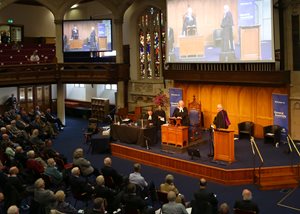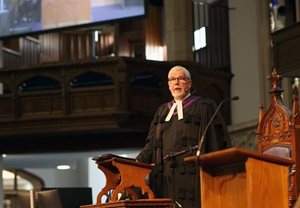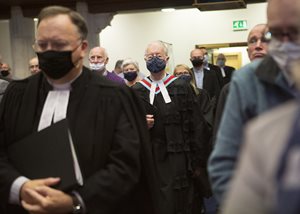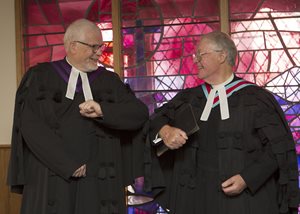In his address to the in person, socially distanced gathering at Assembly Buildings, Dr Bruce thanked the General Assembly for his fresh opportunity to serve, adding, “I sincerely hope the extension of Moderatorial terms of service does not become habit forming.” Dr Bruce was referring to the fact that two-term Moderator’s were not in the recent tradition of the Presbyterian Church in Ireland.
 Opening on a Monday morning, and not the traditional Monday evening, with no procession of former Moderator’s, or civic guests in attendance, only voting members of the General Assembly were present to hear Dr Bruce’s address. In another break with tradition, PCI’s longest serving Moderator, Very Rev Dr Godfrey Brown, who was Moderator in 1988, took the chair briefly for Dr Bruce’s election and appointment as Moderator. He then prayed for him.
Opening on a Monday morning, and not the traditional Monday evening, with no procession of former Moderator’s, or civic guests in attendance, only voting members of the General Assembly were present to hear Dr Bruce’s address. In another break with tradition, PCI’s longest serving Moderator, Very Rev Dr Godfrey Brown, who was Moderator in 1988, took the chair briefly for Dr Bruce’s election and appointment as Moderator. He then prayed for him.
During worship, members of the New Irish Choir and Orchestra, including a string quartet, provided the music to accompany the three hymns sung at the service. Led by Creative Director Jonathan Rea, Sylvia Burnside performed the song ‘There is hope’. The organist was the Rev Mark Spratt, Minister of Kilmore Presbyterian Church. Following the Opening Service and address by the Moderator, three days of debate and decision making began that will focus upon the life and mission of the Church and also touch upon some of the challenging issues facing society across the island.
Reflecting on the year that has passed, Dr Bruce told ministers and elders from PCI’s 500-plus congregations from across Ireland that he could simply list “all the struggles we have faced, and speak of Covid, furlough, vaccinations, social distancing, face-coverings, Brexit, the Northern Ireland Protocol…Lockdowns, container ships grounded in the Suez Canal, interrupted supply chains [and] shortages…and Zoom. Small wonder perhaps that Time magazine labelled 2020 as ‘one of the worst years to be alive in modern history.’
Dr Bruce continued, “Yet 2020 was the year our grandson was born – and his smile lights up the room. It was the year I was privileged to celebrate 100th birthdays with 17 centenarians around the church, and was deeply moved by their stories. During this year, I heard stories of congregations growing while in lockdown – of the curious and afraid, finding hope and forgiveness in Christ online while watching our ministers explain the gospel.
“This was the year when moulds were broken and new ways of doing and being church were conceived. Yes it’s been hard, but as I often quote from Frederick Faber’s great old hymn, ‘Thrice blessed is he to who is given, the instinct that can tell, that God is on the field when he is most invisible.’”
 Dr Bruce continued by observing, “This has not been an easy time to discern the mind of Christ, and having done so to the best of our abilities and insights, then to absorb the angst and pain of others in this unhinged climate. And yet, if this is not the calling of the minister and the church we serve, then what is?”
Dr Bruce continued by observing, “This has not been an easy time to discern the mind of Christ, and having done so to the best of our abilities and insights, then to absorb the angst and pain of others in this unhinged climate. And yet, if this is not the calling of the minister and the church we serve, then what is?”
When churches across Ireland could not meet, carrying on from where his predecessor, Dr William Henry left off, the Moderator recorded a full service - and a further 19 - for each Sunday from June to October. During this time Dr Bruce took the Church through the Apostle Paul’s letter to the Ephesians.
“Ultimately the message of Ephesians is that the impossible needs to be the first item on the agenda for the church. The impossibility of ancient enemies becoming not only friends, but family – adopted as sons and daughters of God in Christ – such an impossibility is an inevitable outcome of the gospel when it is properly explained and daringly lived out.
“What a message for Ireland today. What a message for Europe today. What a message for a world…Paul was a man of the deepest theological convictions, but married this with a servant heart and a pastor’s passion for his people. As a church we need to carefully avoid perpetuating models of control which play to the loudest gallery, while seeking to live faithfully and well to the standards Christ demands of us.
“Jesus’ self-description as gentle and lowly in heart, is neither spineless nor soft, but a robust challenge to those of us called to lead, that we do so to win the people, not to lose them, to restore the sinful, not alienate them, to bind up the broken, not worsen their hurt, and to act as ambassadors of Christ in such a way that he will say to us at the end, ‘Well done, good and faithful servant.’”
Looking forward to his second year in office, Dr Bruce said that he also wanted to “take a few moments to wonder with God about what he might have us do and be, as we look to the future…” Recounting what he said at PCI’s event, ‘On these Steps’ at Union Theological College two weeks ago, to mark the centenary of Northern Ireland and the partition of Ireland, Dr Bruce said that when he spoke, he “…sought to reflect on the future of Ireland and its people… [and] did so on the basis that we ought to be a people of hope rather than despair – the gospel surely demands this of us.”
 He talked about how “north, south east and west on these islands present us with a web of opportunities to grow – economically, culturally and spiritually…” adding, “if we have the vision for it.” He spoke of how a “post-Brexit protocol environment” made this more complicated, adding, “…but if anything it has made more urgent”, he added. “We must work tirelessly to sort out the new configurations of our cultural, commercial and spiritual connections. No shortcuts. No quick fixes. No buck-passing. Just gritty determination to get it done. Whatever a new Ireland resembles, it will not be because someone was victorious, while another was defeated. If it looks like that, it won’t be a new Ireland. It will just be the same old, same old…”
He talked about how “north, south east and west on these islands present us with a web of opportunities to grow – economically, culturally and spiritually…” adding, “if we have the vision for it.” He spoke of how a “post-Brexit protocol environment” made this more complicated, adding, “…but if anything it has made more urgent”, he added. “We must work tirelessly to sort out the new configurations of our cultural, commercial and spiritual connections. No shortcuts. No quick fixes. No buck-passing. Just gritty determination to get it done. Whatever a new Ireland resembles, it will not be because someone was victorious, while another was defeated. If it looks like that, it won’t be a new Ireland. It will just be the same old, same old…”
Dr Bruce continued, “In making these and other remarks I did not want to minimize the challenges of speaking grace into some of the most contentious issues facing us in the public sphere for generations. Ethical issues surrounding our pastoral responses to human identity, sexuality and gender will be debated by us this week, and rightly so. The question of legacy and the need for justice for victims of the troubles is by their own admission the most complex matter facing legislators in the current round.”
He also talked about how the Church was a ‘pro-life church’ and how it was “a great disappointment to us that the Northern Ireland Secretary of State invoked a set of powers effectively bypassing the devolved institutions to impose upon Northern Ireland a deeply permissive abortion regime, far beyond any existing elsewhere on these islands. We remain committed to vocalising our opposition to this, campaigning for changes to the law to protect the lives of unborn children who have no voice regarding their future,” he said.
Dr Bruce spoke of the Church’s ‘genuine concern ’at the introduction of legislation which would have permitted assisted suicide in Ireland. “As a result of many submissions made, including our own, the passage of the Bill has been halted, which is a victory of sorts. But we are aware that another Bill will come, and presumably also a parallel campaign will be launched in Northern Ireland to further challenge what we consider to be the specialness of human life.”
He also spoke about relations on the Ireland of island, north and south, and between Ireland and the United Kingdom, which Dr Bruce described as having been strained, “for reasons which include Brexit, the Northern Ireland Protocol, and our various attempts to mark or note the centenaries, including the formation of a border on this island, thus shaping the United Kingdom in its current form, and the creation of a new state in the Irish Republic.”
 Referencing the Church Leaders Service of Reflection and Hope in Armagh later this month, the Moderator said, “We understand the sensitivities surrounding these anniversaries, and had hoped that the gathering of senior national representatives and local political leaders might have offered a significant public demonstration of a common commitment to peace, reconciliation and hope for the future. We remain resolute that these values will be to the fore in our engagement with governments.”
Referencing the Church Leaders Service of Reflection and Hope in Armagh later this month, the Moderator said, “We understand the sensitivities surrounding these anniversaries, and had hoped that the gathering of senior national representatives and local political leaders might have offered a significant public demonstration of a common commitment to peace, reconciliation and hope for the future. We remain resolute that these values will be to the fore in our engagement with governments.”
Towards the end of his address, Dr Bruce unveiled his theme for his remaining year in office. By simply substituting one letter from ‘Home’, his theme for 2020-2021, its successor will be ‘Hope’. He said that “the puritans who shaped the theology of the reformation were above all else, a people of hope. They believed in the power of the Gospel to transform society – and so they pushed the church out in mission. For them, the world was not a wreck from which people must be plucked, but was the property of Christ to be reclaimed for him.
“For them, the call to mission was a call to engage, not withdraw. They understood themselves not as separatists but as servants of a world in need. Today, we find ourselves in a different kind of place than 17th century England. But the same gospel hopefulness inhabits and shapes our reformed vision of the world, and our belief that the task before us is unfinished, until Christ comes again, as he surely will.”
You can read the Moderator's reflections here and his address as Moderator for the year 2021-2022 here.
Photos (1) PCI's longest serving Moderator, Very Rev Dr Godfrey Brown, who was Moderator 1988-89, take sthe chair for the election and appointment of the Moderator for 2021-2022 (2) The Moderator, Rt Rev Dr David Bruce, addressing the General Assembly, (3) Clerk of the General Assembly Rev Trevor Gribben leads the Moderator's procession into the Assembly Hall (4) together before offical proceedings began, (right) the Moderator Dr David Bruce and his longest serving predecessor, Dr Godfrey Brown.
The General Assembly will meet in Assembly Buildings until the afternoon of Wednesday, 6 October. Business will also take place on Monday and Tuesday evenings. For full details visit the General Assembly Overview page here. As in previous years, throughout the General Assembly there will be a live Twitter feed. You can follow preceedings via @pciassembly hashtag #PCIGA21.